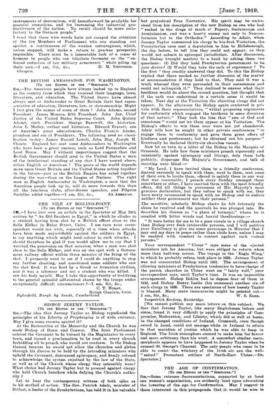THE BRITISH AMBASSADOR FOR WASHINGTON. ITO THE EDITOR , Or xos.
" SPECTATOR."]
Ste,—The American people have always looked up to England as the country from which they received their language, laws, literatures and education. The United States have almost always sent as Ambassador to Great Britain their best repre sentative of education, literature, law, or statesmanship. Might I just give the names of some of them ? John Adams, second President. James Monroe, fifth President. John Jay, Chief Justice of the United States Supreme Court. John Quincy Adams, sixth President. George, Bancroft, the historian. John L. Motley, author and historian. Edward Everett, one of Amerioe's great educationists. Charles Francis Adams, grandson and son of Presidents. The following need no classi- fication to-day James Russell Lowell, John Hay, Joseph H. Choate. England has sent some Ambassadors to Washington who have been a great success; such as Lord Panneefote and- Lord Bryce. May I without impertinence- suggest that the British Government should send to the United States a man of the intellectual standing of any that I have named above, either English or American ? The peace of the world depends• more upon Great Britain and the United States acting together in the future—just as the British- Empire has acted together during the war—than on the League of Nations. The right man as English Ambassador in Washington, a man that the American people look up to, will do more towards this than all the luncheon clubs, after-dinner-speeches, and Pilgrim
Societies added together.—I am, Sir, Ac., An AMERICAN.


































 Previous page
Previous page